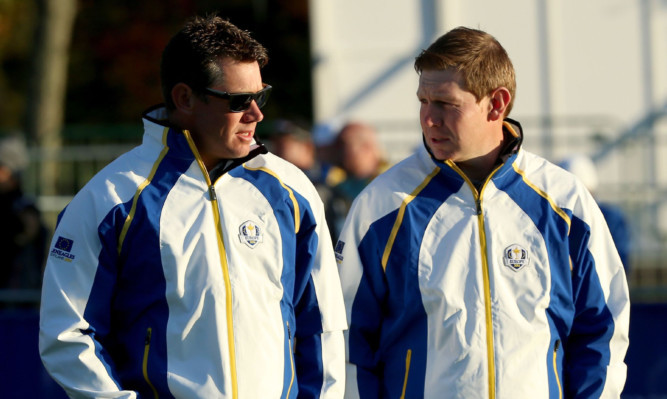Depending on who you speak to, either Rory McIlroy or Ian Poulter will carry the responsibility of “on course leader” for Team Europe at Gleneagles this week.
If there was an actual captain’s armband, rather than a metaphorical one, Lee Westwood would have passed it on to the World Number One or Mr Medinah.
The message coming out of the American camp is that McIlroy and Poulter are the men they most want to neuter beating them being worth more than a point, and all that.
Westwood was once that figure but, with his game having declined over the last two years, isn’t the scalp he used to be.
He didn’t qualify automatically, and had he not been one of Paul McGinley’s three picks it wouldn’t have been the most seismic selection shock this event has known.
The Westwood role this time around won’t be as a “play me five times, you can count on me skipper”. Expect to see him once a day, probably.
But what the waning of his powers won’t affect is the wealth of wisdom he has amassed over his eight Ryder Cups.
If any of the European rookies haven’t sought him out by Friday morning for a quiet man-to-man it would be a dereliction of duty, because nobody (captains and vice-captains included) is better placed to give them an insight into what they’ve signed up for.
“I was nervous on the first tee at Valderrama (his Ryder Cup debut in 1997),” Westwood recalled. “And that was without 3,000 seats at the first tee, and all the hype.
“I would imagine for the rookies it’s going to be a bit of a shock. It’s an intimidating atmosphere. Nothing prepares you for the Ryder Cup and getting on that first tee.
“There’s going to be times this week when they’re surprised about certain things, how intense it is.”
If the scale of the event would suggest taking your Ryder Cup bow is even more traumatic than in Westwood’s day 17 years ago, the Englishman believes the current crop of debutants Stephen Gallacher, Jamie Donaldson and Victor Dubuisson are better equipped than he was.
“The rookies don’t feel like rookies anymore,” he observed. “They play such a good game, and they play at all the big tournaments around the world.
“None of them really remind me of me in ‘97. When I teed up then I didn’t really know anybody on the US team, and there were actually people I didn’t really know on the European side. I really was a rookie.
“In those days we weren’t playing World Golf Championships and I hadn’t played in that many majors. So I really hadn’t spent much time with the likes of Nick Faldo, Bernhard Langer and people like that.
“We play with the rookies nowadays an awful lot. We see more of each other, and the other team as well.
“Jamie Donaldson is more likely to know some of the guys in the US team than I would have in ’97 people like Scott Hoch, Brad Faxon and Mark O’Meara.”
Westwood doesn’t believe however that the development of an unofficial world tour, and the fact that many Europeans now base themselves in the States, has diluted or diminished the intensity of the rivalry and desire to win at Ryder Cups.
“I still think it’s us and them,” he insisted. “I don’t think it’s changed that much. The will to win is still there.
“The way we all come together for bigger events, and they are more regular, doesn’t detract from how much we want to show the Americans that we’re good at golf and want to win the Ryder Cup.”
Team Europe have been cast as anything between favourites to racing certainties for this Ryder Cup a notion that captain Watson has been happy to go along with, and captain McGinley has tried to downplay.
The United States’ pre-match strategy hasn’t gone unnoticed.
“I know the Americans are trying to play the underdog role this week,” Westwood pointed out. “But I don’t see that really working.
“I don’t think there’s underdogs and favourites in this. It’s just a case of who holes putts at the right time, gets the momentum, clings on to that and runs with it as long as possible.
“The sides are very evenly matched. We’re maybe slight favourites with regard to us being at home. Whoever has that advantage becomes slight favourites.
“But, looking at it on paper, it’s a very close match. We’re confident without being complacent and looking forward to showing how well we can play as a team.”
Back in 2008 Lee Westwood had his say on the greens of the PGA Centenary Course. And he didn’t hold back. “Awful” was one description. “Rip them up and redo them all” was another.
“I think there were improvements needing to be made,” was his observation. “I criticised the greens and apparently they put a sub-air system in and it’s made a dramatic improvement. I’m looking forward to going out there today and seeing how the changes have been affected.
“I think the 18th hole has changed. They have raised the tee and changed the green so that’s obviously another improvement.
“There’s not many more spectacular places in the world to play, and Scotland’s the home of golf. It’s great to be playing such a big event in such a special spot. I’m sure it will be a great atmosphere throughout the week.”
